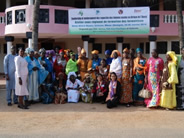
98% of undernourished in the world live in developing countries (FAO, 2012) and 60% of women are affected by hunger (ECOSOC, 2007). Nearly half of the Senegalese population lives below the poverty line ie less than $ 1 (ANSAD, 2007). Women suffer most from this situation (World Bank, 2009) and the phenomenon is more common in cities than in the countryside.
Paradoxically, there is a significant imbalance between the principle of equality and women enjoying their rights fully. Be it in terms of representatives, access to decision-making seats or take into account specific issues, men and women are not on the same footing in Senegal.

